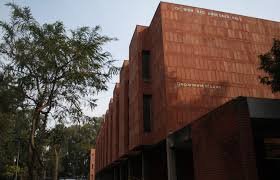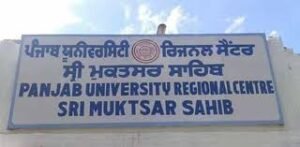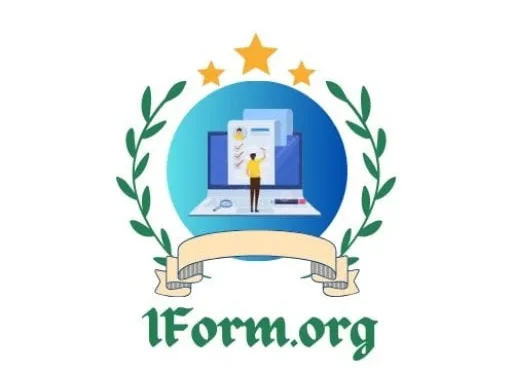The Department of Laws, originally established at Lahore in 1889, was re-established at Shimla in 1948, shifted to Jalandhar in 1950 and finally re-located at the University Campus at Chandigarh in 1959.

Its Alumni include Judges of the Supreme Court and High Courts, Union Cabinet Ministers, State Chief Ministers, Cabinet Ministers, Ambassadors, Senior Bureaucrats, Police Officers and other legal luminaries.
Justice imparting system is the foundation of every civilized nation. Law department formerly known as University Law College is committed to play an important role in the legal system of this university. Stature of this department is as big as its strength. Law graduates from this department are serving all over the country in the lower courts, High Courts and Supreme Court. The faculty of the department consists of 9 Professors, 2 Associate Professors, 5 Assistant Professors, 8 part-time teachers, guest faculty and many Research Scholars working on various Research Programmes.
The Department is the pride alma mater of three Chief Justices of India, a large number of Chief Justices of the High Courts, members of subordinate judiciary, civil servants, law officers and members of the legal profession and a large number of legal luminaries and justices. The number of its alumni, which rose to the bench of the Supreme Court and in many High Courts of this country, is too large to mention. Chief Justice of India Dr. A.S. Anand, the former Chief Justice of India taught in this department for a number of years. The present Chief Justice of India Hon’
Centre as well as a Placement Cell are also functioning in the department. The Department has provision for special lectures in memory of Justice Mehr Chand Mahajan and S. Ajit Singh Sarhadi. These lectures have been delivered over the years by eminent persons such as Justice V.K. Krishna Iyer, Justice V.S. Deshpande, Professor Upinder Bakshi, Dr. L.M. Singhvi, Professor Mool Chand Sharma, Justice J.S. Verma, Mr. Soli J. Sorabjee and Prof. M.R. Madhava Menon. The department has a good library with more than 56,000 documents and 52 regularly subscribed Indian and foreign journals. The Department has also the distinction of having Depository Library for United Nations Documents which is the only library with more than 8000 documents North of India. The Department regularly publishes a Law Journal (Panjab University Law Review).
ble Mr. Justice J.S. Khehar has also been our proud alumnus and taught in the department as well.
The Department is always in action to create new opportunities for its students. In the past, the department had MoU with ELSA (European Law Student Association and run an exchange programme with University of Stockholm. The department had also signed MoU with Fancy Barristers, P.C., New York School to run a course on Demonstrative Advocacy.
The Department provides practical training to LL.B. students. One full paper of 6th Semester includes compulsory participation in two Moots along with the court visits. Special lectures by eminent Academicians, Judges and Senior Advocates which are compulsory as a part of curriculum, are delivered for the benefit of LL.B. and LL.M students. From the academic session 2017-18 onwards, students being admitted in LL.B. course have to undergo internship annually. The students of the department are sent to the Supreme Court of India/Parliament as a part of the practical training programme. The department has a separate and well furnished Moot Court Hall where every year various Seminars, Presentations and Moot Court Competition take place. As a part of Extra- Curriculur activities, every year department conducts a Blood Donation Camp to encourage the students to donate blood and save Life.
Legal Aid Clinic-cum-Arbitration
Dress Code: Black pant and coat, white shirt along with tie/scarf (prescribed) on all formal occasions/functions i.e. moot courts, court visits, presentations, special lectures etc. The girl students have option to wear this dress or white salwar kameez with white dupatta and black coat.
ipsum dolor sit amet, consectetur adipiscing elit. Ut elit tellus, luctus nec ullamcorper mattis, pulvinar dapibus leo.
For the social-economic development of society and qualitatively dignified life of the people, education is most essential. Inspite of three Universities in punjab and one at Chandigarh, the Western Malwa region continues to be the educationally backward even though it is an agriculturally prosperous region of the country.
qualitatively dignified life of the people, education is most essential. Inspite of three Universities in punjab and one at Chandigarh, the Western Malwa region continues to be the educationally backward even though it is an agriculturally prosperous region of the country.
Realizing their responsibility towards the society in general and the development of the backward area in particular, Punjab Government & Panjab University decided to start a regional centre at Muktsar which is an ideal place for the establishment of such a Regional Centre. It has a central location in western Malwa. The need of develop general as well as vocational educational, relevant to the needs and potentialities of he region, is both genuine and urgent. The establishment of this Regional Centre at Muktsar will, therefore, go a long way in bringing up the region in educational attainment and improving the quality of its work-force. There are several well establish colleges all around Muktsar, which will feed the Regional Centre well in promoting Postgraduate courses in important basis disciplines, as also those of vocational significance.
The Regional Centre, Muktsar Campus is to be established on a 100 acre of plot of land, to be acquired by Punjab Govt. An expenditure of Rs. 50 crores is estimated to be incurred for its completion. The Campus will comprise Teaching Department Blocks, Library Building, Administrative Offices, Hostels and a residential complex. In the first phase, an amount of Rs. 25 crores is proposed to be spent on the development of the Regional Centre. When complete, it is likely to be one of the finest Campuses in the Region.
The Regional Centre was inaugurated by the Chief Minister of Punjab, S. Parkash Singh Badal on 08-08-98 and the classes commenced from that day itself. The presence of the entire family of the Chief Minister, the Education Minister and other representatives of the area including M.L.As. S. Harnirpal Singh Sidhu and S. Manpreet Singh Badal was an indication of the deep interest in and awareness of the cause of education in the area. It augurs well for its future.
In its present complex, the Regional Centre has 38 rooms, an entirely Air-conditioned library hall and computer laboratories, canteen & a common room. The admission was full in all the post-graduate classes. In fact, there was a demand for increasing the number of seats in all the Subjects.
About the Town
Muktsar is an historic town having special value for Punjab and the Panjabis as it is the place where Shri Guru Gobind Singh Ji fought last battle with Mughal Rulers. It is situated in the centre situated in the centre of the Western Malwa Region, which is known for its fertile Land and rich crops. It is situated at a distance of 30 kms. From Malout, 60 kms. From Dabwali and Abohar, 55 kms. From Gidderbaha, 30 kms. From Jallalabad and 28 kms. From Guruharsahai. It is appricachable both by road and rail.

Panjab University Regional Centre (PURC) has been established at the campus of P.U. Extension Library, Ludhiana w.e.f. the academic Session 2003-04. Prof. K.N. Pathak, then Vice-Chancellor of Panjab University, Chandigarh took keen interest and fulfilled the long outstanding demand of the residents of Ludhiana and set up the Panjab University Regional Centre at Ludhiana. A sum of Rs 100 Lakhs was provided for the construction of the academic block by Shri Lala Lajpat Rai, then Member of Parliament, from the M.P. Local Area Development Fund Scheme. The Institute was formally inaugurated by His Excellency the Governor of Punjab, Justice O.P. Verma on 5th Oct. 2003. A number of new initiatives are being undertaken under the dynamic leadership of Prof. R.C. Sobti, present Vice Chancellor of Panjab University, Chandigarh.
A three year
LL.B. Course in the evening was started at the Panjab University Regional Centre, P.U. Extension Library, Ludhiana, from the Session 2003-04 as a self financing Course. The sanctioned intake of students every year is 72 seats plus 09 seats for NRI/ NRI sponsored/ Industry sponsored candidates. The same syllabus, examinations pattern is followed at UIL, PURC Ludhiana as followed in the LL.B. Course at the Department of Laws, Panjab University, Chandigarh. Students are admitted on the basis of a Law Entrance Test conducted by the Panjab University, Chandigarh. The syllabus and Course contents are revised from time to time by the Faculty of Laws of Panjab University, Chandigarh.
A five years B.A (Honors) LL.B. course has been introduced from the academic session 2006-07 at this Centre as a self financing course with an intake of 87 seats plus 08 NRI/ NRI sponsored seats. The students are admitted on the basis of a C.E.T. conducted by the Panjab University, Chandigarh. The Syllabus and Course of the BALLB course at UIL, PURC, Ludhiana is the same as that prescribed by the Faculty of Laws, Panjab University, Chandigarh and same syllabus and examinations are followed as that followed by the University Institute of Legal Studies (UILS), Chandigarh conducting the same course.

Panjab University opened a Regional Centre for imparting quality technical education to kandi area hoshiarpur with the name of Swami Sarvanand Giri Panjab University Regional Centre in year 2006 with four branches of engineering. In 2007 Panjab university started two new courses in LAW as BALLB 5 year integrated course and 3 Years LLB course.
The vison of Regional Centre has been made keeping in mind Vision 2025 of Panjab University
Vision:
To Be A Globally Renowned Education Hub that Caters Quality Education.
Mission:
- To create a State-of-the-Art infrastructure that paves the way for new ideas to germinate and create Educationists, Researchers, Innovators, and Entrepreneurs who are compatible with the outside world at Ethical and Global Level.
- To produce a talent that can understand, assimilate and solve the problems in the allied fields at the Local, National, and International levels.
- To collaborate with Educational Institutes and Industries of National and International repute and provide necessary experiential exposure to budding talents.
